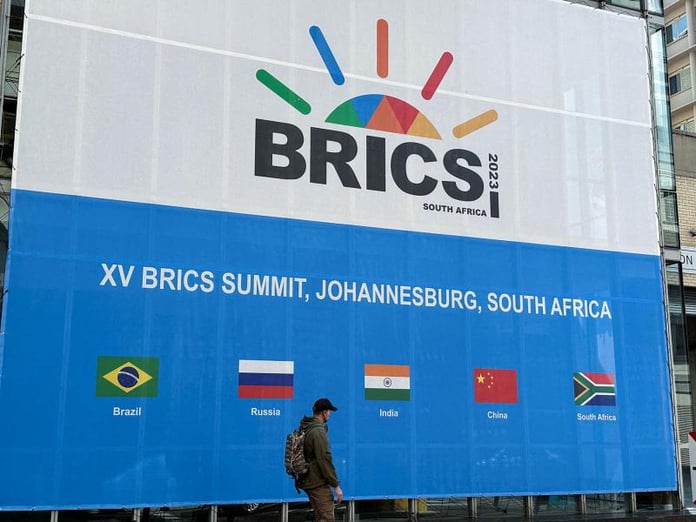The 15th BRICS Summit, a gathering of leaders from Brazil, Russia, India, China, and South Africa, is set to redefine global dynamics as it convenes in Johannesburg. With an agenda that includes the possible expansion of the emerging market grouping, the ongoing war in Ukraine, and intricate relations with the West, the summit is poised to be a pivotal moment in international politics.
The Gathering of Power
Hosted by South African President Cyril Ramaphosa, the current BRICS chair, the meeting brings together Chinese President Xi Jinping, Brazilian President Luiz Inácio Lula da Silva, Indian Prime Minister Narendra Modi, and Russian Foreign Minister Sergei Lavrov. Russian President Vladimir Putin will join virtually, given the current arrest warrant from the International Criminal Court for war crimes.
The summit has attracted 67 leaders from across Africa, Latin America, the Middle East, Asia, and the Caribbean, excluding Western leaders. Dignitaries such as the U.N. secretary-general, chair of the African Union Commission, and president of the New Development Bank are also in attendance.
Expansion: A Central Focus
A defining aspect of the summit is the potential expansion of BRICS, with over 40 countries expressing interest in joining, including major economic hubs like Nigeria, Saudi Arabia, and Iran. A total of 23 countries have formally applied, including Saudi Arabia, Iran, the UAE, Argentina, Indonesia, Egypt, and Ethiopia.
However, the informal nature of many expressions of interest highlights the global divide that many countries are attempting to navigate. Gustavo de Carvalho, a senior researcher at the South African Institute of International Affairs, noted that final decisions on new members are unlikely to emerge from the summit. Instead, the aim will be to establish a clear process, criteria, and timeframe for applications and admittance.
Differing Views on Expansion
India has historically been cautious about expansion, fearing increased Chinese influence within BRICS. Russia, on the other hand, has become more vocal in accepting expansion due to its international isolation. Brazil’s stance has shifted, with the Lula administration voicing concern about potentially diluting the group’s effectiveness.
In a televised address, Ramaphosa explicitly supported expansion, particularly for fellow African nations. This support comes in light of punitive Western economic sanctions against Russia, leading other BRICS and affiliated countries to seek ways to reduce risk exposure in the international financial system.
The Anti-Western Tone and the Three Camps
Russian and Chinese officials have struck an increasingly anti-Western tone, looking to build support for a broad coalition to challenge U.S. dominance, reports CNBC. While some analysts have suggested a significant anti-Western turn, South Africa, India, and Brazil have signaled an intention to maintain closer ties with traditional Western partners.
Some reports have cited Chinese officials aiming to position BRICS as a direct geopolitical rival to the G7. However, Ramaphosa insisted that South Africa would “not be drawn into a contest between global powers” and sought to retain its independence in an “increasingly polarized” world.
BRICS vs. G7: Rivalry or Cooperation?
The BRICS group operates on consensus and collaborates on aspects of its various economies where interests align, rather than forming a unilateral “alliance”. Steven Gruzd, head of the African governance and diplomacy program at the SAIIA, argued that BRICS “already is a rival to the G7” as it has established itself as one of the pre-eminent voices of the emerging economies.
The world has witnessed a division into three camps due to the Russian invasion of Ukraine – pro-West, pro-Russia-and-China, and non-aligned. These splits are set to continue and widen, especially as the non-aligned face enormous pressure to join other camps.
What BRICS Is and What It Is Not
Though much of the narratives surrounding BRICS focus on growing Chinese and Russian influence, there is a mistaken assumption that China has “unlimited influence” within the other BRICS societies. The freedom of BRICS countries to chart their courses on global issues has been highlighted in responses to Russia’s war in Ukraine.
“It is often useful to reflect on what BRICS is not: BRICS is not an alliance,” de Carvalho insisted. The hope for this summit is to foster more nuanced discussions around what BRICS is and what it is not, providing a clearer understanding of this institution’s role in global engagement.


